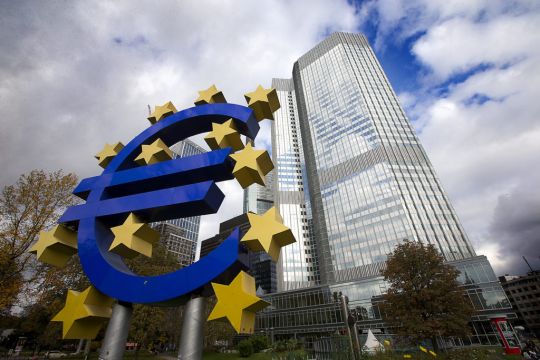The European Central Bank promised fresh support for the bloc's indebted southern rim on Wednesday, tempering a market rout that threatened a repeat of the debt crisis that almost brought down the single currency a decade ago.
Government borrowing costs have soared on Eurzone's periphery since the ECB unveiled plans last Thursday to raise interest rates to tame painfully high inflation.
But the bank failed to reassure investors it would contain the rise in borrowing costs, making only a vague pledge and stoking fears it was abandoning more indebted nations, such as Italy, Spain and Greece, which have struggled for years under the weight of massive debt piles.
Reversing course just six days later, the ECB said it would direct cash to more indebted nations from debt maturing in a recently-ended €1.7 trillion pandemic support scheme, adding it would work on a new instrument to prevent an excessive divergence in borrowing costs.
"The Governing Council decided to mandate the relevant Eurosystem Committees together with the ECB services to accelerate the completion of the design of a new anti-fragmentation instrument for consideration by the Governing Council," the ECB said after an extraordinary meeting.
However, ECB chief Christine Lagarde also tried to temper expectations, arguing that the ECB's job is taming inflation, not helping budgets.
"We cannot surrender to fiscal dominance," Ms Lagarde said at a forum in London. "Neither can we surrender to finance dominance; we have to deliver on our mandate."
Dutch central bank chief Klaas Knot said that policymakers instructed staff to work at an accelerated pace on the new tool, in case sending reinvestments south were not enough.
"If it will not be enough, rest assured that we stand ready," Mr Knot told a conference.
Bare minimum?
The ECB's statement calmed markets but left many underwhelmed.
"I think essentially it is the bare minimum of what could be expected, but I also believe it's the most realistic outcome of what they could compromise today," Danske Bank economist Piet Christiansen said.
Holger Schmieding, an economist at Berenberg meanwhile argued that the ECB was merely correcting last week's mistake.
"Last Thursday, such words would probably have made a decisive and possibly lasting difference," he said. "But after the turmoil of the last few days, markets are now more nervous than before. The ECB thus faces a bigger risk that markets may test the ECB’s resolve again soon."
The announcement also drew fire from those who argued the ECB risked going too far.
"The ECB’s job is to deliver on price stability, not to ensure favourable financing conditions," Markus Ferber, a German conservative member of the European Parliament said. "Some countries now simply get the bill for years of irresponsible fiscal policies."
"If the ECB now launches yet another programme to keep spreads low, it edges dangerously close (to) monetary state financing," Mr Ferber said.
The euro fell close to 1 per cent against the dollar after the ECB statement, but Italian yields eased to comfortably below 4 per cent.
The spread between 10-year Italian and German bonds, a key indicator, meanwhile eased to around 222 basis points from close to 250 basis points on Tuesday, indicating confidence that the ECB will eventually act more firmly, perhaps at the July 21st policy meeting, when it is all but certain to raise rates for the first time in over a decade.
There is no universally accepted level for this spread, but Carlo Messina, the chief executive of Intesa, Italy's largest bank, earlier on Wednesday said the country's economic fundamentals would justify 100-150 basis points.
The spread on 10-year Spanish bonds was meanwhile little changed at 126 basis points, while for Greece was around 262 basis points, broadly in line with its level before the ECB statement.
The ECB's move comes on the same day that the US Federal Reserve is expected to hike interest rates, with investors dramatically raising their bets for a 75 basis point increase, a swing in expectations that has fuelled a violent sell-off across world markets.







